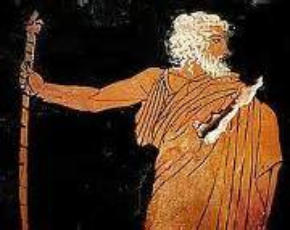
The Wine Red Sea:
Journeys of Odysseus

© Copyright 2014 -2024
by Peter J Ponzio
King Nestor, Book III

After Telemachus and Athena arrive at Pylos, they are greeted by King Nestor, his sons and nobles at a feast. Observing the proper forms for greeting guests,
King Nestor invites the strangers to join them. Before partaking of the generous helpings of meat and drink, Athena offered a libation to her uncle, Poseidon. After the
feasting was done, Nestor asked about his guests, using the accustomed formula:
Now's the time, now they've enjoyed their meal,
to probe our guests and find out who they are.
Strangers-friends, who are you?
Where did you sail from, over the running sea-lanes?
Out on a trading spree or roving the waves like pirates,
sea-wolves raiding at will, who risk their lives
to plunder other men? (III, 77-83)
Telemachus, inspired by Athena, replied to Nestor's questions:
Nestor, son of Neleus, Achaea's pride and glory-
where are we from, you ask? I will tell you all.
We hail from Ithaca, under the heights of Nion.
Our mission here is personal, nothing public now,
I am on the trail of my father's widespread fame,
you see, searching the earth to catch some news
King Nestor
of great-hearted King Odysseus, who, they say,
fought with you to demolish Troy some years ago. (III, 87-94)
Nestor details the fighting on the plains of Troy, and indicates that: “.. . no one there could hope to rival Odysseus,/not for sheer cunning-/at every twist of strategy
he excelled us all./Your father, yes, if you are in fact his son” (III, 134-137). Nestor's ambiguous acceptance of Telemachus as the son of Odysseus, would have
unnerved the Prince earlier in the tale, but now, it does not seem to affect him.
Nestor then relates the death of Agamemnon, returning to the theme of the parallel between Orestes/Agamemnon and Telemachus/Odysseus:
But Atreus' son Agamemnon . . .you yourselves,
even in far-off Ithaca, must have heard how he returned,
how Aegisthus hatched the king's horrendous death.
But what a price he paid, in blood, in suffering.
Ah how fine it is, when a man is brought down,
to leave a son behind! Orestes took revenge,
He killed that cunning, murderous Aegisthus,
who's killed his famous father. And you, my friend-
how tall and handsome I see you now-be brave, you too,
so men to come will sing your praises down the years. (III 218-227)


- The goddess and the prince
- The goddess and the prince, page 2
- The goddess and the prince, page 3
- The prince departs
- The prince departs, page 2
- King Nestor
- King Nestor, page 2
- King Nestor, page 3
- Menelaus and Helen
- Menelaus and Helen, page 2
- Menelaus and Helen, page 3
- Journeys in the land of the gods
- Calypso's Island
- Calypso's Island, page 2
- Nausicaa
- Nausicaa, page 2
- In the land of the phaeacians
- In the land of the phaeacians, page 2
- Revelations
- Revelations, page 2
- Revelations, page 3
- Revelations, page 4
- Odysseus revealed
- Odysseus revealed, page 2
- The Cyclopes
- The Cyclopes, page 2
- The Cyclopes, page 3
- Circe
- Crice, page 2
- Circe, page 3
- Among the dead
- Among the dead, page 2
- Among the dead, page 3
- Among the dead, page 4
- Among the dead, page 5
- The first journey ends
- The first journey ends, page 2
- The first journey ends, page 3
- The first journey ends, page 4


- Home
- Home, page 2
- Home, page 3
- Home, page 4
- Eumaeus
- Eumaeus, page 2
- Eumaeus, page 3
- The prince returns
- The prince returns, page 2
- The prince returns, page 3
- Father and son reunited
- Father and son reunited, page 2
- Father and sone reunited, page 3
- The beggar at the palace
- The beggar at the palace, page 2
- The beggar at the palace, page 3
- Preparing for the test
- Preparing for the test, page 2
- Preparing for the test, page 3
- Interview with the queen
- Interview with the queen, page 2
- Interview with the queen, page 3
- Interview with the queen, page 4
- Interview with the queen, page 5
- The coming storm
- The coming storm, page 2
- The coming storm, page 3
- The storm arrives
- The storm arrives, page 2
- The storm arrives, page 3
- The king returns
- The king returns, page 2
- The king returns, page 3
- Odysseus and Penelope reunited
- Odysseus and Penelope reunited, page 2
- Odysseus and Penelope reunited, page 3
- Odysseus and Penelope reunited, page 4
- Peace restored
- Peace restored, page 2
- Peace restored, page 3
- Peace restored, page 4
- Epilogue
- Naming Odysseus
- Naming Odysseus, page 2
















